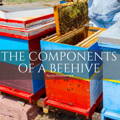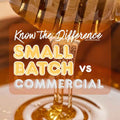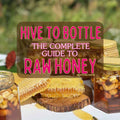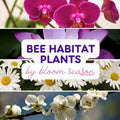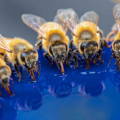
The Importance of Spring Feeding Honeybee Hives
Feeding honey bees in the spring is crucial for their well-being and overall colony health. Spring is a critical time for honey bee colonies as they recover from winter and start building up their populations and resources. Here are several reasons why feeding honey bees in the spring is important.
Subscribe
To join our mailing list and never miss an update!
FUN FACT: The hexagon shapes that form honeycomb hold the most amount of honey with the smallest amount of beeswax required. Perfect efficiency.
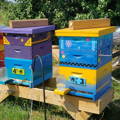
Feeding honey bees in the spring is a crucial practice that beekeepers employ to support the well-being and vitality of honey bee colonies. As winter gives way to the awakening of nature, honey bees face a pivotal period of recovery and growth.
This transitional phase demands ample resources for the bees to rebuild their populations, nourish developing brood, replenish depleted honey stores, and ensure the colony's overall strength.
By understanding the importance of feeding honey bees in the spring, beekeepers can play a vital role in sustaining healthy colonies and fostering the productivity of these remarkable pollinators.
FUN FACT: The hexagon shapes that form honeycomb hold the most amount of honey with the smallest amount of beeswax required. Perfect efficiency.
1. Nectar Availability is Low in Spring
In early spring, there may be a scarcity of nectar-producing flowers or a delay in their bloom due to weather conditions. Feeding bees provides them with an alternative food source until natural nectar becomes abundant.
Many a hive has made it through the Winter with emptied honey stores, to face starvation and colony collapse in the Spring before nectar-producing flowers have bloomed.
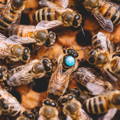
2. Pollen is Critical to Brood Development
Spring is a time when busy bee colonies focus on raising a new generation of worker bees. To ensure the brood (larvae) have enough nutrition for successful development, the bees need a protein-rich diet.
Providing them with pollen or pollen substitutes is what ensures the optimal amount of nutrition so that they can produce royal jelly, which is an essential part of the larvae's diet. Supplementing their protein intake in this way will lead to robust brood development that promotes colony growth and an increased number of healthy workers capable of performing hive tasks.
Pollen patties, pollen powders and a variety of other forms are easily available for beekeepers to purchase and supplement their colony with the protein they need in this crucial stage of development.
3. Honey Stores are Depleted and Need Replenished
Honey bees rely on stored honey reserves as their primary food source during periods of low or no nectar flow. Over winter, colonies may have consumed a significant portion of their honey stores. Supplemental feeding in spring helps replenish these reserves, preventing food shortages that can lead to weakened colonies or even starvation.
Supplying the honeybee colony with the resources it needs to replenish and build an expanded store of resources will better equip them to survive and thrive in situations such as unexpected nectar dearth or unfavorable weather conditions. Adequate honey reserves are critical to helping sustain honey bees when they need it most.
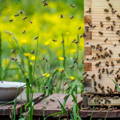
4. Colony Growth is Explosive in Spring
Spring is a period of rapid expansion and population growth for honey bee colonies. The availability of abundant food resources, particularly carbohydrates in the form of sugar syrup, signals to the colony that favorable conditions exist for expansion.
Feeding bees with sugar syrup or other appropriate food sources stimulates the queen to lay more eggs because the colony knows that the resources are available right outside their front door to increase the number of mouths they have to feed. A strong and thriving colony is better equipped to collect nectar, pollen, and propolis, and it is more likely to produce surplus honey.
5. Providing Sufficient Resources Aids in Swarm Prevention
Adequate nutrition plays a role in swarm prevention. When a honey bee colony becomes crowded and resource-limited, it may decide to swarm, dividing the colony into two. By providing ample food resources, particularly carbohydrates in the form of sugar syrup, you can help reduce the likelihood of swarming by providing the colony with the necessary resources to expand and accommodate its growing population.
Trending Products
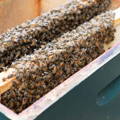
6. Thriving Hives Have a Higher Disease Resistance
Well-nourished bees are generally healthier and more resilient to diseases and parasites. Proper nutrition strengthens the bees' immune systems, making them better equipped to combat pathogens and pests that can affect colony health. A strong colony can corral and contain small hive beetles until you have the opportunity to treat them as well as protect the hive from predators such as yellow jackets, varroa mites and wax moths.
Sugar Syrup Recipes
When feeding honey bees, it's important to use appropriate feeders and feed formulations recommended by experienced beekeepers or local beekeeping associations. This ensures that the bees receive the necessary nutrients without causing any harm.
The ratio of sugar to water in your simple syrup should be adjusted depending on the time of year and hive activity occurring as detailed in the chart below.
Additionally, beekeepers should be mindful of using organic and pesticide-free food sources to avoid introducing harmful substances into the hive.

When feeding honey bees, it's important to use appropriate feeders and feed formulations recommended by experienced beekeepers or local beekeeping associations. This ensures that the bees receive the necessary nutrients without causing any harm.
Additionally, beekeepers should be mindful of using organic and pesticide-free food sources to avoid introducing harmful substances into the hive.
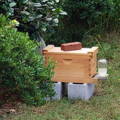
In conclusion, feeding honey bees in the spring is a multi-faceted practice that profoundly impacts the health, growth, and productivity of honey bee colonies. By recognizing the importance of this seasonal feeding, beekeepers contribute to the well-being of their bees and the sustainability of honey bee populations as vital pollinators.
The provision of supplementary nutrition supports brood development, replenishes honey stores, stimulates colony growth, enhances disease resistance, and aids in swarm prevention. Through these efforts, beekeepers and researchers can work hand in hand to safeguard honey bee populations, ensuring their vital role in pollination and the preservation of ecosystems for generations to come.
Copyright©2023 All rights reserved. We love to have you share our article as long as you include a direct link to this page. Please contact us for permission and we’ll be happy to collaborate. This article or any portion thereof , including all images, may not be reproduced or used in any manner whatsoever without the express written permission of Gypsy Shoals Farm.

